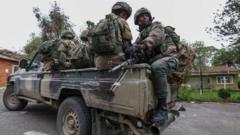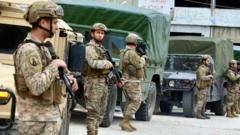The conflict in Myanmar is marked by a significant shift as defectors, known as 'Watermelons,' infiltrate the military to provide crucial intelligence to pro-democracy rebels. Once maintaining control over the majority of the country, the military now governs only 21% of Myanmar, while ethnic armies and civilian militias hold sway over 42%. The spies, motivated by anger and the need for survival, face peril from both sides while they assist the resistance in ambushes and strategic attacks. As the junta's brutality escalates, these 'Watermelons' fight to reshape the future of their nation.
Myanmar’s 'Watermelon' Spies Turn the Tide for Pro-Democracy Forces

Myanmar’s 'Watermelon' Spies Turn the Tide for Pro-Democracy Forces
An inside look at how defectors from the Myanmar military are aiding resistance movements against the junta.
The article text:
The conflict in Myanmar has taken a critical turn as members of the military, referred to as "Watermelons," are defecting and secretly aiding pro-democracy rebels, according to a BBC investigation. These spies are emblematic of the fractures within a once-mighty military, now struggling to maintain its grasp on the nation. Data indicates that military control has plummeted to just 21% of the country, while 42% is now under the control of ethnic armies and civilian militias, a significant shift from the junta's earlier dominance.
"Watermelons" are soldiers who appear loyal to the military but covertly support the rebels, symbolized by their red colors. One defector, Kyaw (a pseudonym), cited the military's brutality, including the torture of civilians, as the catalyst for his betrayal. He, along with many others, chose espionage as a means to serve the pro-democracy movement—leaking vital military information to the People’s Defense Forces (PDF) to orchestrate ambushes and avoid direct engagements with military units.
With over 20,000 detained and thousands dead since the military's coup in February 2021, the landscape of power has dramatically shifted. The military's control is reportedly at its lowest since seizing power in 1962 and fighting continues to intensify. The rise of the 'Watermelon' network has facilitated collaboration between civilian militias and ethnic armies, putting the military on the defensive.
Win Aung, a former military intelligence officer turned rebel agent, actively manages this espionage network. He reports that the influx of new spies into their ranks has been bolstered by social media, with many coming from various military ranks. These operatives undergo a rigorous vetting process to ensure they are not double agents.
For many, the rationale for risking their lives to spy for the resistance is deeply personal. Moe, a naval corporal, was driven by the primal urge to protect his family amid the turmoil. With pregnant wife Cho urging him to defy the regime, Moe began surreptitiously supplying military insights. The intelligence he gathers regarding troop movements and weapon caches provides a strategic edge to the resistance’s fighters.
Resistance leaders, like Daeva, have adapted their strategies based on Watermelon intel, coordinating attacks even on urban centers like Yangon, which remains firmly under military control. Daeva, operating from a jungle base, has employed this information for directed strikes against military targets.
However, being a Watermelon is fraught with danger. Agents live in constant fear of exposure from either side, as the junta actively hunts for defectors. When Moe was relocated to a more perilous front, he realized he had to escape. Thanks to an underground network, he successfully fled to a safe area controlled by the resistance.
Despite the growing momentum for the rebels, they support is a double-edged sword for the ‘Watermelons.’ Many spies, including Kyaw and Moe, endure the anxiety of being discovered. Reports indicate that as the military loses ground, its response has become increasingly brutal and indiscriminate.
The espionage efforts by individuals like Kyaw and Moe symbolize a determined resistance against oppression. The future of Myanmar hinges on these covert operations and the growing unity among resistance factions. As the conflict escalates, their dedication to the cause remains an inspiring story of courage and resilience against an oppressive regime.
The conflict in Myanmar has taken a critical turn as members of the military, referred to as "Watermelons," are defecting and secretly aiding pro-democracy rebels, according to a BBC investigation. These spies are emblematic of the fractures within a once-mighty military, now struggling to maintain its grasp on the nation. Data indicates that military control has plummeted to just 21% of the country, while 42% is now under the control of ethnic armies and civilian militias, a significant shift from the junta's earlier dominance.
"Watermelons" are soldiers who appear loyal to the military but covertly support the rebels, symbolized by their red colors. One defector, Kyaw (a pseudonym), cited the military's brutality, including the torture of civilians, as the catalyst for his betrayal. He, along with many others, chose espionage as a means to serve the pro-democracy movement—leaking vital military information to the People’s Defense Forces (PDF) to orchestrate ambushes and avoid direct engagements with military units.
With over 20,000 detained and thousands dead since the military's coup in February 2021, the landscape of power has dramatically shifted. The military's control is reportedly at its lowest since seizing power in 1962 and fighting continues to intensify. The rise of the 'Watermelon' network has facilitated collaboration between civilian militias and ethnic armies, putting the military on the defensive.
Win Aung, a former military intelligence officer turned rebel agent, actively manages this espionage network. He reports that the influx of new spies into their ranks has been bolstered by social media, with many coming from various military ranks. These operatives undergo a rigorous vetting process to ensure they are not double agents.
For many, the rationale for risking their lives to spy for the resistance is deeply personal. Moe, a naval corporal, was driven by the primal urge to protect his family amid the turmoil. With pregnant wife Cho urging him to defy the regime, Moe began surreptitiously supplying military insights. The intelligence he gathers regarding troop movements and weapon caches provides a strategic edge to the resistance’s fighters.
Resistance leaders, like Daeva, have adapted their strategies based on Watermelon intel, coordinating attacks even on urban centers like Yangon, which remains firmly under military control. Daeva, operating from a jungle base, has employed this information for directed strikes against military targets.
However, being a Watermelon is fraught with danger. Agents live in constant fear of exposure from either side, as the junta actively hunts for defectors. When Moe was relocated to a more perilous front, he realized he had to escape. Thanks to an underground network, he successfully fled to a safe area controlled by the resistance.
Despite the growing momentum for the rebels, they support is a double-edged sword for the ‘Watermelons.’ Many spies, including Kyaw and Moe, endure the anxiety of being discovered. Reports indicate that as the military loses ground, its response has become increasingly brutal and indiscriminate.
The espionage efforts by individuals like Kyaw and Moe symbolize a determined resistance against oppression. The future of Myanmar hinges on these covert operations and the growing unity among resistance factions. As the conflict escalates, their dedication to the cause remains an inspiring story of courage and resilience against an oppressive regime.




















